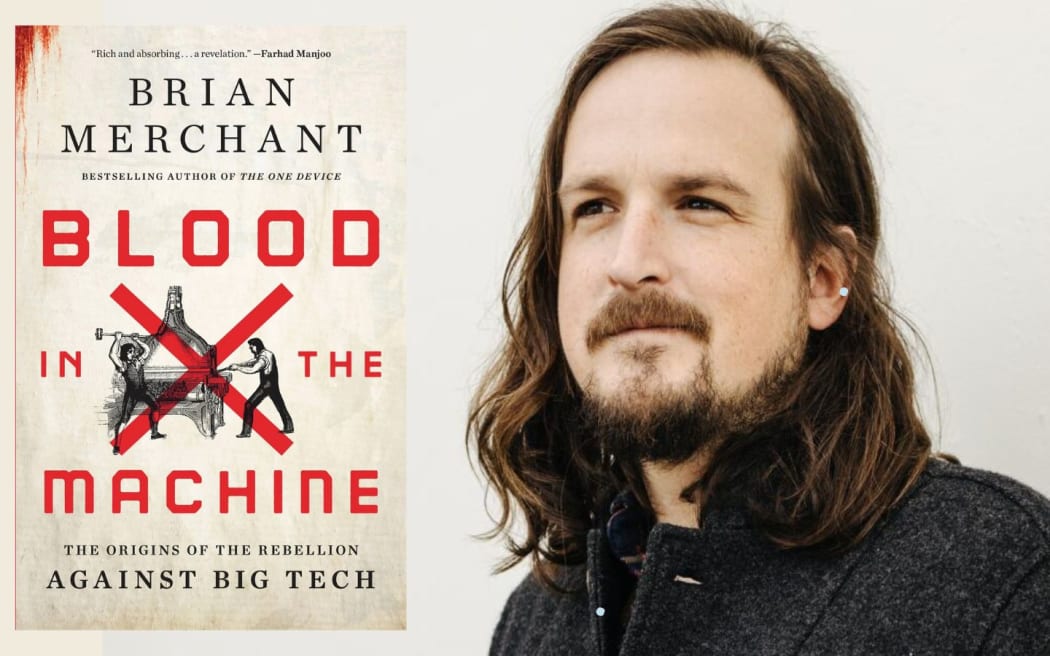Little has changed since the days when Luddites were breaking up machinery that threatened their way of life, says the author of a new book.
Blood in the Machine by LA Times technology journalist Brian Merchant charts how we respond to the current moment of AI job automation and draws on the experiences of the Luddites 200 years before.
The way that technologies were developed and deployed during the early industrial revolution and now in the digital age is anti-democratic, Merchant says.

Photo: brian merchant
“It's built and organised by those who have access to the enormous amount of resources that are necessary to start an Amazon or launch Uber, you need lots and lots of venture capital cash these days.
“And if you can get it, then you have basically secured the right and the ability to build a platform or a mode of work that could potentially affect millions and millions of people.”
It was a similar arrangement with the first tech titans, he says.
Richard Arkwright patented the water frame, used in the cotton mills of England, and is thought to be the father of the modern factory, Merchant says.
“It is the use of a technology, a well-financed, well-heeled technology in the name of profits, to erode social norms, standards, regulations, and that is what looks astonishingly similar then and now.
“Those early tech titans, they used their technologies, chiefly to argue that the old rules didn't apply, that they could trample over laws that were on the books, then and now that would, regulate who can join a trade or how much training somebody needs or whether or not a certain standard of quality has to be met.”
Uber did exactly the same, he says.
“When Uber showed up and said we are a software platform, we're not a taxi company, we're a tech company, so we don't have to play by the rules of your stodgy old municipal code.
“And we don't have to pay attention to the regulations of the taxi sector, we can do as we please.”
The result is traditional taxi drivers lost their living and Uber driver live an often precarious and impoverished existence, he says.
He doesn’t believe that pushing back against the march of tech such as AI is futile or naively utopian.
“There's any number of things we could do. We could more heavily regulate the venture capital sector so that they don't have the ability to just pour willy-nilly hundreds of millions to billions of dollars into any company that they choose, without being taxed appropriately. We could do that.
“It's anything from a piecemeal approach to a more comprehensive policy approach. And it may seem utopian to say, well, everybody should have a say, in how the technology that affects their lives, is developed and deployed, but I think that's what we should at least strive towards, because the opposite is having it shoved down our throats and then having to constantly play a rearguard action against the excesses and detriments to that model, that has proved to have an enormous array of ill side effects.”
The massive growth in executive salaries compared with workers is also reminiscent of 200 years’ ago, he says.
“That's a pretty good sign, if there ever was one, that the benefits of technology are not accruing to society at large or to the average person.
“It’s just like 200 years ago, the vast majority of those benefits are occurring to the people who own manage and decide how everybody else should use or be subjected to technology.”
There are glimmers of a Luddite-like fightback in the US, he says
“The labour movement here in the States is revitalised in ways that it hasn't been for decades, there is hope, at least.”
The march of technology amounts to a war on normal people, he says.
“There will be a number of folks who are left behind or deeply unpreferenced, I guess, in terms of career advancement, and that kind of thing.
“I don't worry as much about the machine apocalypse happening tomorrow, or even in five years. I do worry about these systems exacerbating inequality. Making precarious workers, more precarious, and advantaging a select few over others. That's typically what automation technologies have done in the past.
“And I don't think there's any reason to think it'll be different this time. And in fact, it could be worse.”

